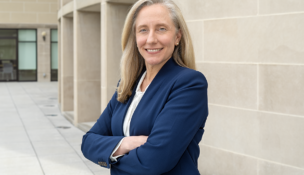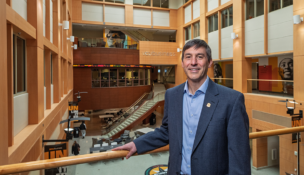An uneven year
Counties diversify to escape the effects of sequestration
Virginia Business //February 28, 2015//
An uneven year
Counties diversify to escape the effects of sequestration
Virginia Business //February 28, 2015//
Last year ended with mixed reviews for economic development in Northern Virginia. Prince William and Loudoun counties turned in strong years while Fairfax and Arlington experienced a slowdown.
Fairfax, however, has begun 2015 with a bang. In February, the Inova Health System announced that it will lease the 117-acre Exxon Mobil campus to create a complex for the Center for Personalized Health.
The varied results in the region stem from the ongoing effect of sequestration — across-the- board federal budget cuts begun in 2013. To combat the drop in federal spending in a region dense with government contractors, Northern Virginia counties are diversifying their economies and looking to new industry sectors.
Each Northern Virginia county has had its brush with sequestration, but some fared better than others. Prince William County followed its record-breaking year of 2013 — when it posted $1 billion in capital investment — with yet another strong year, more than $500 million in capital investment and 382 new jobs.
“It was our fourth-best year of capital investment since 1977,” says Jeff Kaczmarek, executive director of the county’s Department of Economic Development.
The county, however, isn’t immune to the effects of sequestration. “Our federal contractors — well over 200 in the county — are definitely concerned about sequestration. Their biggest concern is the uncertainty. People don’t know what the impact will be on them,” Kaczmarek says.
Like its neighboring counties, Prince William is constantly diversifying its economy, growing in areas such as technology, life sciences, game design and logistics. It is also seeing an increase in cybersecurity, data centers, and modeling and simulation companies.
Last year the county opened two technology incubators: the Virginia Serious Game Institute at George Mason University’s Prince William campus and the Prince William Science Accelerator.
Virginia Serious Game Institute houses five startups involved in modeling and simulation for a variety of industries, including health care, defense and education.
The Prince William Science Accelerator focuses on aiding companies involved in life sciences. “Our first tenant in the accelerator, ISOThrive, was recruited from California,” Kaczmarek says. “It makes a prebiotic compound that helps with the digestive system.”
The county also crossed the 2-million-square-foot mark in total data-center space last year.
Loudoun County recruited and assisted 188 prospects last year. It announced 39 project wins, accounting for almost $250 million in new investment. The county saw growth in information technology and communications technology as well as health IT and personalized medicine, aviation and logistics services, and agriculture.
“We are very proud of a big deal we closed on our rural side.” says Buddy Rizer, director of Loudoun’s Department of Economic Development. Last year Black Hops Farms LLC announced it would convert 15 acres of former pastureland into a hopsyard and also build a new processing facility for hops, an important ingredient in craft beers. The new plant will be the mid-Atlantic’s first commercial-scale hops production and processing facility. In addition to developing its beer industry, Loudoun is home to 42 wineries that together have an estimated $136 million economic impact on the county.
The data-center industry in the county continues to grow, with more than 5.6 million square feet of space. Loudoun’s 56 data centers generate an estimated $60 million in revenue each year. Last year Texas-based CyrusOne, which provides data-center facilities, began building the first phase of a project that will reach 400,000 square feet when it is completed.
The county was also able to attract the U.S. Department of Interior, which moved its offices from Fairfax. The $2 million investment will bring in 400 jobs. Loudoun also competed with Maryland to retain cybersecurity company Telos Corp. The company will invest $5 million to expand its headquarters and create 160 jobs.
The big news in Fairfax is the Inova announcement. It plans to develop a complex devoted to treatment of diseases through therapies geared to each patient’s genetic makeup. Inova’s Translational Medicine Institute will move to the new site.
Gerald L. Gordon, president and CEO of the Fairfax County Economic Development Authority, says the move puts the county on a worldwide stage. The center will attract top researchers as well as critical research dollars, he says.
“We have never had that attractive element in the economy before. Now all of a sudden we have a research magnet,” says Gordon.
The big payoff will come when the discoveries made by researchers are commercialized. “There will be companies being established and jobs being created,” Gordon says.
Fairfax saw its pace slow down last year. Job growth numbers — 6,803 new jobs — were still positive but were not as high as in the past. “The federal government still remains the largest buyer of goods in the world and it has slowed,” says Gordon.
Because of the slowdown, federal contractors in Fairfax are becoming effective at “translating their skills to private applications and growing those applications,” Gordon says.
The county began diversifying decades ago. It has many major companies — such as Volkswagen Group of America, Capital One and Hilton Worldwide — that are unrelated to federal contracts. Most of the county’s growth last year was focused in Tysons Corner because of the opening of four new Metro stations. A fifth metro station opened in Reston. “That has spurred a great deal of growth,” Gordon says.
Thanks to the county’s approval of a master plan that allows for unlimited densities around a Metro station, new buildings being constructed are higher than in the past. “Before we had buildings that were 17 to 18 stories in Tysons Corner and now we have several with 25 to 30 stories,” Gordon says.
The opening of the Metro stations enticed Intelsat S.A., a provider of satellite services, to move its administrative headquarters and 400 jobs from Washington, D.C., to Tysons. “What they told us was, ‘No Metro, no way,’” Gordon says.
In Arlington, Christina Winn, director of business investment for Arlington County, considers 2014 to be a transitional year. Business is down from 2013, but the county attracted and retained businesses occupying 1.1 million square feet of space (attracting 2,000 jobs while keeping 3,000 others).
Currently one-fifth of the county’s real estate space is vacant. “We expected that because of Defense Base Realignment and Closure [BRAC], sequestration and budget impacts,” says Winn. “We lost the equivalent of four [military bases]. That would have devastated most communities. But overall Arlington is resilient. We still have job growth.”
Arlington’s workforce increasingly is mobile, working from locations other than an office. Although businesses still are looking for new office space, “they are looking for smaller spaces,” she says. “We are not getting users taking larger spaces.”
The county is filling the vacant spaces with high-growth entrepreneurs and emerging technology companies. “These are generally companies that have experience,” she says. “They have product lines, and they want to expand their product lines or they want to do business with the government.”
TandemNSI, a public-private partnership between Amplifier Ventures and Arlington Economic Development, provides these companies with connections to national security agencies that will need innovative technology products.
One of the county’s largest deals last year involved retention of the Corporate Executive Board (CEB), a member-based advisory firm. CEB will invest $150 million and create 800 jobs in addition to the 1,200 people it already employs in Arlington.
The $50 million Crystal Tech Fund venture capital firm officially launched in April in Arlington’s Crystal City neighborhood. The project, founded by Paul Singh, CEO of Disruption Corp., focuses on backing post-seed startups with investments ranging from $250,000 to $1 million.
Since its opening, the fund already has helped more than a dozen companies and is planning to double its workspace. “Paul Singh’s vision is to build a productivity center for entrepreneurs, which he hopes will eventually become a sustainable model for other cities,” Winn says.
-


















